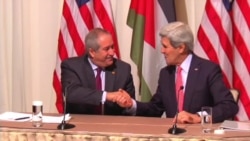Jordan executed two militants at dawn Wednesday in response to the Islamic State group killing one of its pilots.
The militants included Sajida al-Rishawi, an Iraqi woman who was on death row for her role in a 2005 suicide bombing in Amman. The Islamic State had demanded she be released.
Jordanian authorities executed her a day after a video emerged online appearing to show the militant group burning Jordanian pilot Muath al-Kaseasbeh alive while he was locked in a cage.
He was captured after his plane went down in Syria in late December while flying as part of the U.S.-led coalition conducting airstrikes against the Islamic State group. He was apparently killed on January 3.
Late Tuesday, a spokesperson for the Office of the Director of National Intelligence said U.S. officials "have no reason to doubt the authenticity of the video."
Jordan had insisted the militants provide evidence al-Kaseasbeh was alive before they released al-Rishawi in a prisoner exchange.
A grim-looking Jordanian King Abdullah addressed the nation from Washington, where he had been meeting with U.S. leaders.
The king was reported to be cutting his U.S. visit short to return to Amman, where people were taking to the streets in protest after learning of the pilot's death, shouting angrily and chanting his name as they called for revenge on Islamic State militants.
"This is cowardly terror by a criminal group that has no relation to Islam," the king told his people. "The brave pilot gave his life defending his faith, country and nation, and joined other Jordanian martyrs."
News agencies quoted security sources as saying Jordan plans to execute the Iraqi woman whom Islamic State had demanded Jordan free from prison. Sajida al-Rishawi is on death row in Amman for her role in a 2005 suicide bombing.
Jordan's participation in coalition airstrikes against fellow Muslims has been unpopular within the country.
Kaseasbeh was captured in December after his fighter jet crashed near Raqqa, Syria, the de facto capital of the extremist militant organization's proclaimed Islamic caliphate.
International condemnation
President Barack Obama, who met with King Abdullah Tuesday, called the video just one more indication of the Islamic State's "viciousness and barbarity."
"And it, I think, will redouble the vigilance and determination on the part of a global coalition to make sure that they are degraded and ultimately defeated," the president told reporters. "Whatever ideology they're operating off of, it's bankrupt."
Vice President Joseph Biden hosted Jordan's King Abdullah at the Naval Observatory Tuesday in Washington, D.C., where he offered condolences to Kasasbeh's family and all Jordanians before condemning the killings and calling for the release of all prisoners held by Islamic State militants.
Abdullah was in Washington for meetings with Biden and U.S. Secretary of State John Kerry, and was expected to attend Thursday's National Prayer Breakfast. News of the video surfaced just as Kerry had issued a fresh appeal Tuesday for Kaseasbeh's safe return.
"The people of Jordan need to know that all Americans will join with them in praying for the early and safe return of Lt. Muath al-Kaseasbeh," the captured pilot, Kerry had said shortly after signing a new agreement for U.S. aid to Jordan alongside Jordanian Foreign Minister Nasser Judeh.
See related video by VOA's Pamela Dockins
U.S. National Security Council spokeswoman Bernadette Meehan said the intelligence community is working to confirm the video's authenticity.
"The United States strongly condemns [the Islamic State group's] actions and we call for the immediate release of all those held captive by ISIL," she said, using an acronym for the group. "We stand in solidarity with the government of Jordan and the Jordanian people."
General Lloyd Austin, the head of U.S. Central Command, which oversees the campaign against the militants, issued a statement Tuesday saying Kaseasbeh "served his country courageously and honorably" and was an important member of the anti-IS team.
United Nations Secretary-General Ban Ki-moon condemned the pilot's murder and said Islamic State is a terrorist group with no regard for human life.
"Our brave hero Muath will always be remembered as a symbol of courage," said Jordan's ambassador to the United Nations Dina Kawar, in a post on Twitter. "May God bless his soul and rest him in peace."
Memorandum
The new U.S. memorandum of understanding signed Tuesday with Jordan also comes as the Middle Eastern nation struggles to support hundreds of thousands of Syrian refugees.
Kerry said the U.S. will now provide $1 billion a year to Jordan through 2017. He said the amount covers economic, technical and security support and represents an increase from the past five years, when the U.S. gave $600 million a year through the memorandum.
Kerry said the U.S. is also adding to the $467 million it has already contributed to help Jordan care for refugees from both Syria and Iraq, as well as extending loan guarantees to Amman.
"Increased need means a requirement for increased help," he said after meeting with both Judeh and Jordan's King Abdullah II.
Judeh described the new agreement as "another milestone" in the strategic partnership between the U.S. and Jordan, saying U.S. assistance to Jordan "has proved instrumental" to the success of the nation's development and reform program.
"At this time of peril and turbulence — what's new in our part of the world? — Jordan again is committed to the promotion of stability and peace and security in a region where peace and stability and security have eluded us for many, many years," Judeh said.
In addition to the fight against the Islamic State, Jordan is also a vital U.S. partner in the Israeli-Palestinian peace process.
Jeff Seldin and Carla Babb contributed to this report from Washington.







